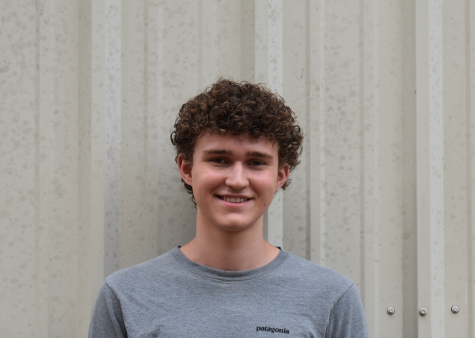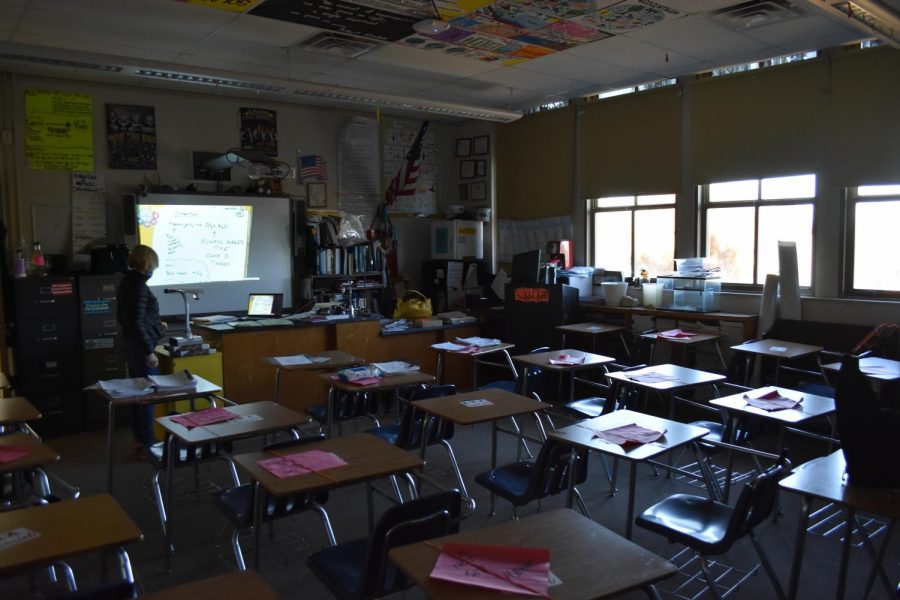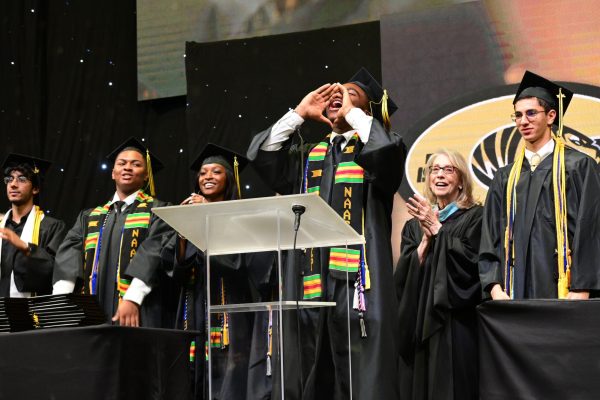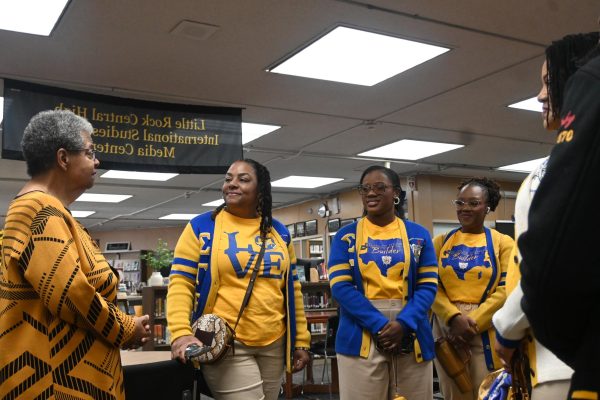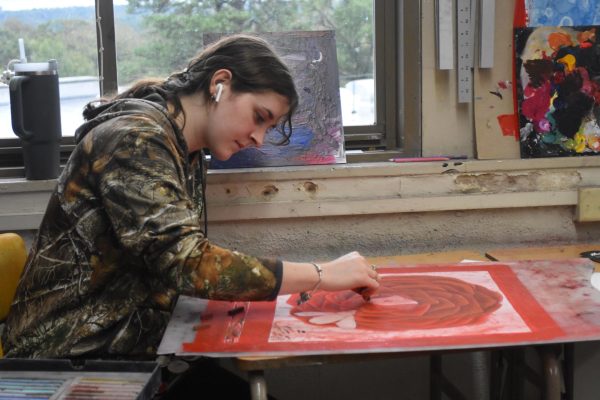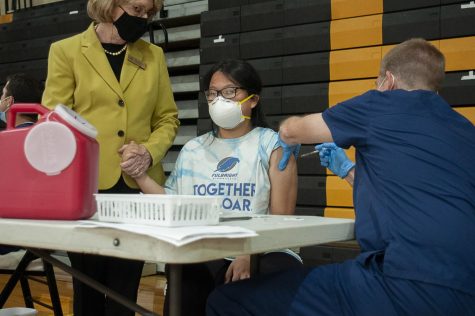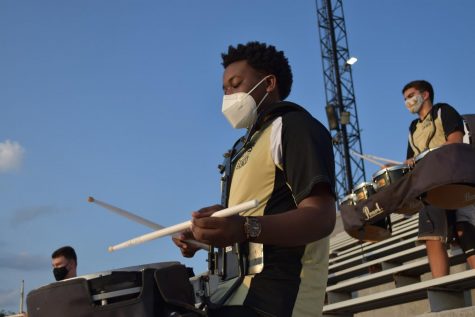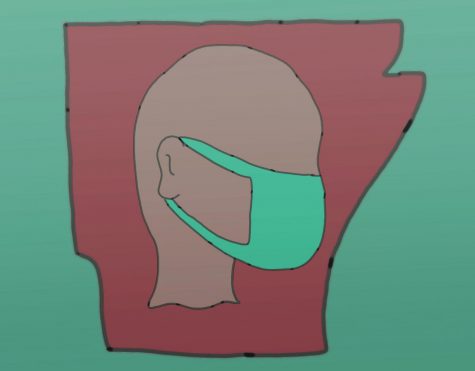Teachers Face Challenges in New School Year
Life since March has been nothing but disarray. Our world was shut down, and all aspects of normal life were turned on their head. Life had to become distant, and interaction was scarce. There was breaking news every time you turned your head, but still nothing ever changed. People were full of questions, fears, and confusion. Then the new school year came up, and students were given a choice to attend school in person or from home. But even school brought no new normalcy or order. The preparation for this year was just as chaotic as the rest of life and the burden continues to fall upon teachers even in the second semester to provide learning in a way they never had before.
“Preparing for the year was very hectic and stressful. For so much of the summer, I had no idea if we were going to come back in person or virtually. We didn’t get access to Schoology until right before school started. Over the summer I had recorded lectures, because I really had no idea what school was going to be like, if we would go to the building, or anything.,” AP U.S. History teacher Matthew Dean said.
With so many unknowns and few specific plans going into the year, Governor Asa Hutchinson announced a two-week delay to the start of school. But teachers still did not know whether this would be the start of virtual learning, in-person instruction, or a combination.
“I don’t think the district was ready to start school when we did and I don’t think that they were attentive to issues. This district wasn’t listening to our concerns and they didn’t give us any answers. There were no two-way conversations going on. If we ask questions, they avoid a yes or no answer. We don’t feel like a part of the district because they don’t take our requests and questions to heart,” Spanish Teacher Marco Dorfsman said.
The restart date for the school year was pushed to August 24, two weeks from its original date. Even with this delay, the first week of school had no actual learning or assignments for students to do. Because of the disorganization of the restart of school, many teachers did not have faith in the plan to be successful.
“I don’t think that we should have been in person. I know that a lot of families simply don’t have the option to have their children be at home and I am incredibly sympathetic and sensitive to that fact; but I think that the way that we have done it and the limitations that we’ve had with the lack of long-time preparation just made it a bad idea. We’ve had to put in an unbelievable amount of hours getting virtual and in-person plans ready, It’s like doing double teaching duty. What would’ve ordinarily been a Sunday getting my normal lessons ready to go for the week, I’m now spending eight or nine hours getting things ready for all my students,” debate teacher Rosie Valdez said.
Two years ago Valdez had a rare condition when giving birth to her son called HELLP syndrome (Hemolysis, elevated liver enzymes, and low platelets). Her son was born two months early and had to spend the first few months of his life in the hospital. This immunocompromised her son and prevented him from being able to attend daycare for the first year of his life, even before COVID-19 swept through the nation. Valdez is still immunocompromised also, as she has diminished liver and kidney functions. She purchased a bubble which surrounds her desk and a $500 air purifier for the bubble.
“I considered not returning this year. I really struggled for much of the summer deciding if I could walk away from my career, my students, and my debate program that I’ve invested so much in. I felt so much conflict about prioritizing my family’s safety and not wanting to lose my job, and I still feel that way every day,” Valdez said.
Hannah Evans, a theatre teacher, also has an autoimmune disorder and her husband, school band director Brice Evans, has asthma. She purchased both a bubble and an air purifier, and she wears two masks at all times.
“When school started it was very frantic. In theatre we expected a lot more students to come to school than they did. Because theatre is so collaborative, it’s a really hard curriculum to face. We had to retool performances so kids could film them from home. In my Theatre III and IV classes the communication is really good because they all know each other and have been doing theatre together for so long, But in Theatre I and II communication is really difficult because they don’t all know each other and it really makes learning and also teaching hard,” Hannah Evans said.
Despite teachers’ best efforts, communication with students simply cannot be proficient. With no one to make them do their work, online students struggle to turn in all their assignments. Also, the separation between in-person students with both teachers and other students can put a damper on their learning.
“It’s hard to teach Spanish now because learning a language is like learning to play a sport, you need constant practice and repetition. In class students can’t really do it, and it’s really awkward to do over zoom. I feel that my in-person students are really depressed, when they come into class they seem tired and like they just don’t want to be there. Concerning numbers of online students are not joining meetings regularly and don’t turn in all their work. It’s really disheartening for me to see these things from my students,” Dorfsman said.
Teachers must interact with two groups simultaneously. One group right in front of them but all separated by six feet, and the other on a screen who may never turn on their camera or microphone. This lack of connection between teacher and student has made teaching more difficult for many.
“I do this job because of the interactions with the students and the connections with the kids, and when you’re all wearing masks and you have to be on zoom and most kids don’t turn their camera on and most won’t talk to you it’s very frustrating. I’ve realized how much I need the interactions with my students also, it’s what causes them to trust me as a teacher and it causes me to be more enthusiastic. I fear that there are going to be kids that fall through the cracks even if I do everything in my power to try and help them,” Toni Hearn said.
